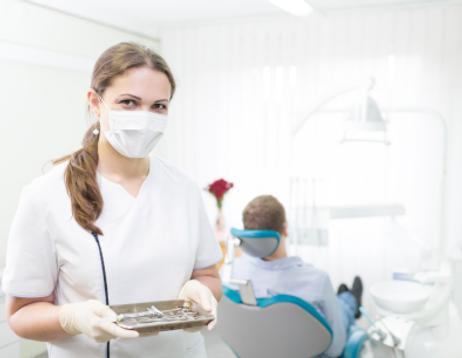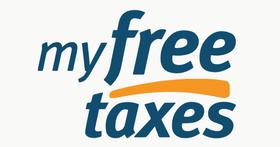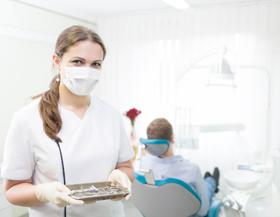In challenging economic times, many people may delay visits to the dentist because they cannot afford to pay the accompanying bill. Many college students who struggle to pay for tuition, books, housing, and other educational expenses also often put off dental work. While this plan may seem wise in the short term, neglecting one’s oral health can lead to serious health and financial consequences down the road. Those who do not get regular dental cleanings and check-ups put themselves at an increased risk for gum disease and cavities, both of which can lead to future financial and physical pain when the problems eventually need to be treated.
Fortunately, for college students who may not have the finances to pay for dental work or those whose health insurance does not include a dental plan, a lack of funds does not necessarily mean one’s dental health care needs to suffer. Community colleges with dental hygienist training programs often offer low-cost or even free dental services to college students and children and adults in the general public.
This video gives an overview of the dental and other health services available at Wake Technical Community College in Raleigh, North Carolina.
Dental services at community colleges are fairly comparable across the nation. To help you get an idea of the kinds of services offered, as well as potential pricing, we will examine a few college-based dental clinics.
Normandale Community College
The Dental Hygiene Clinic at Normandale Community College in Bloomington, Minnesota, provides comprehensive services to adult patients from the college and children and adults in the community. Many basic services include dental screenings, soft tissue examinations, cleaning, fluoride treatment, and periodontal assessments. Educational information is also provided, including tips for better oral hygiene. In fact, some patients may find there is an unexpected benefit to receiving oral care from a dental hygienist in training. Because dental hygiene students must be painstaking as they learn on the job, patients often learn more about their teeth and oral anatomy than they would in a normal dental visit. The downside to this is that dental appointments at college clinics can often take as many as 2-3 hours because students are working on refining their knowledge and skills and have to take their time.
Fees for these services vary, from $40 for an adult cleaning to $20 for comprehensive X-rays. While dental hygiene students provide these services, they work under the supervision of licensed dentists and faculty from the college’s dental hygiene program.
Lane Community College
Lane Community College in Eugene, Oregon, also offers a low-cost dental clinic staffed by students in its dental hygiene associate’s degree program. The program’s website notes that the clinic is open to the general public but prioritizes adults “who have not had regular preventative dental care.” All services are provided in a patient-centered manner and focus on preventative as well as therapeutic dental care.
The Lane Community College Clinic can provide various services, including dental cleaning, X-rays, dental screenings, fluoride treatment, sealant, and oral hygiene instruction. Like most of these low-cost community college dental clinics, the Lane Clinic does not perform every dental service. Patients who require services beyond the scope of those offered at the clinic are referred to a dentist in the community.
Pricing depends on the service provided. The clinic offers screenings free of charge. Adult cleanings are $40, sealants are $5 per tooth, and panoramic X-rays are $25.00. Dental students at the school provide all services. However, licensed dentists and dental hygienists supervise all work.
Tallahassee Community College
The Dental Hygiene Clinic at Tallahassee Community College allows dental students to learn the necessary skills while providing low-cost services to the general public. Child, adult, and elderly patients are welcome. Services provided include dental exams, tooth scaling and polishing, oral cancer screening, and X-rays. Students can also advise patients on nutritional issues and proper dental care techniques, such as brushing and flossing.
Students perform all procedures but are supervised closely by licensed dental hygienists and dentists. Fees range from $9 for a full-mouth X-ray to $2 for each tooth sealant to $12 for adult dental scaling and polishing.
Other Community Colleges Offer One-Day-Only Clinics
Many other community colleges across the country offer periodic one-day-only clinics in which children and sometimes adults can get free or low-cost dental care from dental hygienists in training. For example, Nanticoke, Pennsylvania’s Luzerne County Community College, sponsors a Kids’ Cavity Prevention Day. The event, which promotes good oral health for children, offers kids between the ages of three and 16 the opportunity to get a free dental exam, anti-cavity varnish, and pit and fissure sealants. The event is co-sponsored by the Northeast Pennsylvania Dental Hygiene Association and held at the Health Sciences Center's dental clinic on campus.
This video discusses the dental hygiene program at Tulsa Community College.
Clinics Limited to Preventative Treatment
For those planning to take advantage of the low-cost or free dental services that community colleges offer, it’s important to remember that the clinics only perform preventative services in almost all cases. Dental hygienist students in these clinics will usually perform the following services:
- Examine teeth for apparent signs of decay
- Clean and polish teeth
- Provide fluoride treatment to help prevent tooth decay
- Provide instruction in proper brushing and flossing technique
- Provide X-rays (in some clinics)
- Provide nutritional counseling
- Discuss with patients what further dental treatment may be needed
- Provide referrals to dentists in the community who can offer further treatment
Patients should not go to low-cost dental clinics for non-preventative services, such as having a cavity filled or a crown repaired. These procedures are complex and require the services of a licensed dentist.
This video offers an overview of the free dental program at Springfield Technical Community College.
However, prospective patients should remember that an ounce of prevention is often worth a pound of cure. Filings, crowns, and other dental work can be costly, with or without health insurance. But a good way to reduce the likelihood of needing such work in the future is to get regular preventative dental care in the present. And while millions of Americans are getting insurance through the federal marketplace as part of the Affordable Care Act, adult dental coverage is not currently included. As a result, it is essential for those struggling with limited budgets to seek dental care via low-cost dental clinics, as they provide an ideal way to maintain oral hygiene and prevent future dental problems while conserving cash.
Questions? Contact us on Facebook. @communitycollegereview















